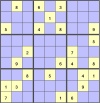The Acol Bidding System
Menu

Play Sudoku

Fish Database

Bird Database

Plant Database
Introduction
Bidding starts with the dealer and continues around the table in a clockwise direction until three consecutive players have announced "No Bid", at which time the auction is over and the game progresses to playing the cards.
Acol is a natural system of bidding, meaning that your bidding is normally a declaration of your holding and not some coded message. The first thing you need to do before bidding is evaluate your hand. Having evaluated your hand, you should then bid the strongest bid that fits your hand. Weaker bids hold the negative information for your partner that you do not hold enough strength to have bid anything stronger! Always bid your cards to their full extent.
The first bid other than "No Bid" is known as the "Opening Bid". That players partner is then referred to here as the "Responder". When the opening bidder, bids for the second time, that is referred to here as the "Rebid". Once a partnership have opened the bidding, if the opposition also start bidding, that is known as intervening bidding. In order to intervene you need a rather different shape/strength of hand than for the normal opening bid, because you now know that one of the opposition holds a better than average hand!
Evaluating your Hand
In order to bid accurately, you need to be able to value your hand. The standard method of valuing cards is the Milton Work high card scoring system.
As well as high card points, when playing with an unbalanced hand, some additional points are given for length, as obviously even small valued cards can be winners when they are the trump suit.
Having established the value of your hand, you also need to look at the shape and decide whether you are going to bid No Trump or which suit(s) you can bid. No Trump hands are balanced hands, containing a maximum of one doubleton, no singletons or voids and stoppers in at least three suits. Stoppers are cards that you believe will eventually win a trick within a few rounds of play of that suit. Without stoppers, if the opposition hold a great length in that suit, you can lose a lot of tricks before getting started with your own plan of attack! Suits are biddable when you hold a length of four cards headed by at least one honour card or you hold five or more cards. This is also an area often debated, as some people would never open on a suit as bad as Jxxx or just five rags!
In addition to counting high card points and length, some strong hands are better count purely based on how many tricks you believe you can make, assuming an even distribution of the rest of the cards. This is known as the Playing Trick count. Sometimes this is an obvious calculation, eg. if you hold AKQJxx, then you are likely to make all six tricks in that suit. If you hold AKJxx, it is much harder to define, but you have to assume that you're likely to lose one round to the Q and therefore you hold 4 playing tricks. I've not seen a mathematical description about how to count this value anywhere.
Another method used for evaluating hands is the count of the number of Quick Tricks. Quick Tricks are tricks that you can play and win without losing any rounds, so AKJxx counts only for 2 tricks.
Milton Work High Card Points
The cards are given the following values:
- Ace = 4
- King = 3
- Queen = 2
- Jack = 1
There are a total of 40 points in the entire pack of cards (10 per suit), therefore an average hand will contain 10 points.
Counting Points for Length
There are various methods for counting length, some always count just long suits, others count short suits and the one implemented in WolfBridge counts long suits when declaring a new suit, but counts shortages when responding to partners suit.
For long suits count an extra point for the fifth card in any suit and every card beyond. i.e. for a seven card suit, you would count 3 extra points.
To count shortage use the following table (only applicable to suits other than declarers trump suit).
- Void = 3
- Singleton = 2
- Doubleton = 1
Opening Bids
With a balanced hand you should be looking at opening in NT. Balanced hands are hands that contain no singletons or voids and a maximum of one doubleton. On top of that you should also have stoppers in three suits, stoppers being either and A, a Kx, Qxx or a bare minimum of Jxxx.
Unbalanced hands or hands that otherwise don't fit the criteria for bidding NT should be opened with a suit. A suit is biddable at the one level if you hold four cards with at least one honour card. If you have two biddable suits of different lengths, bid the longest suit first. If you hold two biddable suits of equal length, bid the highest suit first, unless they are spades and clubs, in which case bid the clubs first. If you hold three four card suits, bid the suit below the singleton, unless it's clubs in which case bid hearts.
You should always try to open with the maximum bid that fits your hand as a weaker opener denies values for the stronger opening bid.
The following list shows the more usual opening bids in descending order of strength.
- 2 Clubs - 5 Quick Tricks >= 23 HCP's
- 2 NT - Balanced Hand HCPs 20-22
- 2 Suit - 8 Playing Tricks
- 1 NT- Balanced Hand HCPs 15-17
- 1 Suit - Four card biddable suit HCP's 13-21
In addition to the list above there are some 4 Suit and 3 suit opening bids (called preemptive bids) that show playing tricks rather than HCP's and are meant to shut out the opposition from bidding. They are most usually bid third in play after two No Bids, as in that position you might be concerned that fourth in play could have a very strong hand.
Acol also includes a light opener, for hands that have merit from shape more than HCP's. You may open 1 of a suit with just 10-12 HCPs if you hold either two five card biddable suits or a single six card suit.
Further Reading
More detailed information about the acol bidding system can be found in the following web pages:
